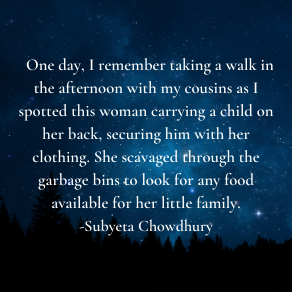
My 11-year old self set foot in Bangladesh with no expectations nor ideas of what the land would look like, what the air would smell like, what a taxi would look like, or even how the people commonly dressed. Learning about the country from stories of my mother’s childhood, movies, and television shows made me feel well equipped to be able to easily adjust to the new environment for our short stay. However, the high poverty level and class differences were apparent to any foreigner visiting the country. The paved sidewalks of New York City greatly differed from the roads covered in trash where people sat. It didn’t take much to notice this, but it does take courage and empathy to want to do something about this.
Bangladesh is a developing country with a high poverty rate. When I visited the country, I was alarmed by how different living conditions were. One day, I remember taking a walk in the afternoon with my cousins as I spotted this woman carrying a child on her back, securing him with her clothing. She scavaged through the garbage bins to look for any food available for her little family. I urged my cousins to buy some dinner for the woman and her son for the night. She thanked us and her smile overwhelmed 11-year old me with joy. Later, back at home, as I laid down, I stayed awake thinking of how many more people are looking for a meal, knowing that the next one is not guaranteed.
Children the same age as me, if not younger, learned to pick up labor before they picked up pens. They learned to serve those that called their name before they even learned to spell it. If you were a fortunate child born into a wealthy family, education might be an accessible priority. However, if you were an unfortunate child born to serve such wealthy families, education seemed like a luxury.
My education, for instance, is something that I take pride in and will forever be grateful for. In the United States, education is a priority and a right, but this should be the case for everyone anywhere in the world. Bangladesh is one country among many in South Asia where children are forced to worry about their next meal. School supplies are not as easily accessible for many. These young children are forced to grow up too early, having to worry about how they will make ends meet for their family. However, I would love to change this by making various resources readily available to those in need.
I aspire to improve these conditions by holding school supply and meal drives. One such way of doing so would be to hand out school bags filled with notebooks, pencils, and even more to various under-funded schools throughout the country. Even donations of clothing, such as winter jackets and scarves, can save another family from freezing during the harsh winter. Not only did I witness high poverty levels on the streets, but also in hospitals. Exposed to the medical inequities in global healthcare, I was inspired to look into the medical field to become a future pediatrician. Visiting my own pediatrician’s office even became a second home to me. It is a goal of mine to diminish these inequities in developing countries, ensuring that those that need medical care receive it. When I visited my grandma in the hospital in Bangladesh a few summers ago, I had donated medical supplies, such as gauze, ointment, soap, rubbing alcohol, and even sanitary pads for young girls. I witnessed the impact these donations had on the patients, bringing a smile to both the hospital staff and the families of the patients there. Continuing to do so by funding medical centers would greatly help anyone, including children.
In my spare time, I enjoy teaching others of all ages. Teaching children and truly making an impact on their academic lives motivates me to further help those in need. This past year, a few friends and I have even started our own successful tutoring/mentoring program for elementary/middle school students. I hope to start my own non-profit organization, reaching even more children. I plan to continue teaching children in any way I can, further helping them learn more about themselves and the world around them, equipping them with the knowledge and tools needed to implement change in their own community. Fundraisers and drives can be crucial for this. I would also like to write articles and gain media exposure to shed more light and awareness on this issue. This way, potential collaborations with other similar organizations could make great change for many children.
To make a difference in someone’s life, even if through donations, can enable children to value the importance of education and, more importantly, value the experiences of being a kid—being able to study, play, and live with no worry. I still remember the woman’s smile and the signs of relief on her face when she realized her and her child did not have to sleep hungry that night. Bringing such a smile to the faces of children all over the world is a meaningful and invaluable goal of mine. It is commonly said, “The grass is always greener on the other side,” but from where I am right now, it would truly be an honor to actually make it greener for children on the other side of the world.
